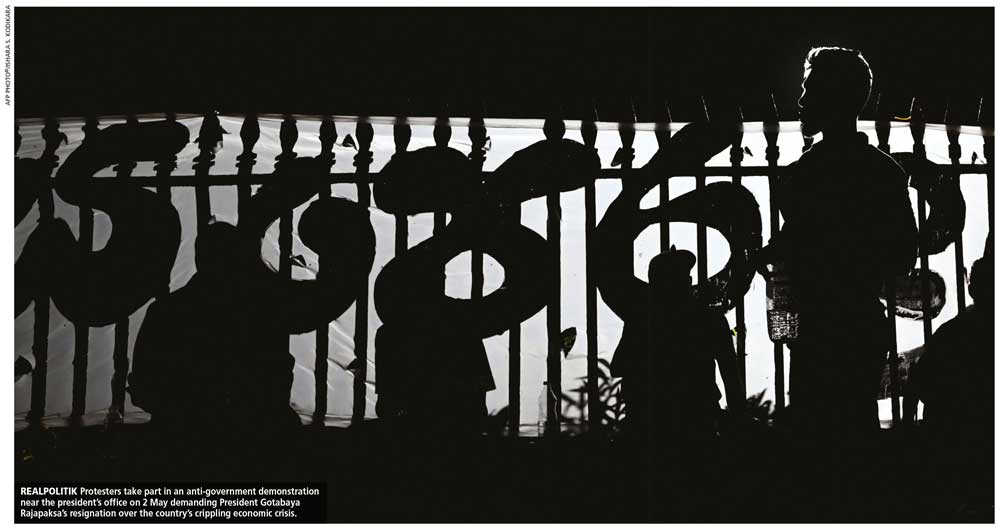STATE OF THE NATION
FLOUNDERING IN REALPOLITIK’S SHALLOWS!
Wijith DeChickera writes in resignation that the fate of the nation hangs in the balance – not hinging on principled politics but realpolitik

Sri Lanka seemed to be on the cusp of sweeping change recently when the unthinkable happened. The state – in the person and work of a former prime minister – played a card that has almost always trumped the best intentions of reformers: state sanctioned violence.
The resultant chaos saw a reversal of fortunes for the people’s protest that had steadily gathered steam for a month or so.
For one, it showed that in the face of a threat to the citizenry, the police would be – or choose to be – ineffectual. For another, the near anarchical violence in the aftermath of the premier’s resignation proved their impotence in spades.
From the frying pan into the fire went the fat when a beleaguered president called out what is in effect the ‘national guard’ – our peacetime country’s inordinately beefed up standing army. After the insult of the emergency declared came the injury of a crippling curfew. But in the true spirit of islander resilience, protestors built back their emblematic GotaGoGama (GGG).
Sadly for the authenticity of the protest’s ethos, revelations on social media showed that where the citizenry by and large had assumed the movement to be organic and apolitical, there was a hint of orchestration and political presence on the ground at Galle Face.
If commonsense prevails however, and popular support for GGG is not withdrawn, the force of apolitical pressure on our once cornered corrupt governors could continue unabated.
On the other hand, any subversive attempt to infiltrate, co-own or push the protest movement along political lines must be decried by the nation at large and firmly yet peacefully resisted on the ground.
It is not only ‘Occupy Galle Face’ that has had its legitimacy questioned.
In the wake of a series of policy misadventures spanning the gamut from the fiscal management of the country to controversial approaches to governance, the moral right of the incumbent chief executive to continue in his all-powerful office has been at the forefront of the protests.
The political deadlock in the executive arm of government saw the ignominious exit of a political figure who once strode the national stage like a colossus and whose legacy continued to cast a violent shadow even after his resignation.
His declaration that he would play a major role in the choice of successor to the prime ministerial office brought another conundrum into play… in the form of controversies around the national list MP who inherited the mantle.
With a single seat in parliament following an electoral drubbing as a result of 2019’s Easter Sunday bombings and the farce that followed in terms of accountability, the new prime minister has had his work cut out.
By no means a tyro at governance, the highly experienced but much maligned premier has had to contend with challenges that not even his detractors would envy…
On the one hand, he had to accept the responsibility of forming a cabinet at a time when (unsurprisingly) there were no takers to assume the daunting task at hand… that of rescuing a floundering nation from the direst of doldrums that our ship of state has ever sailed.
And on the other, he had to contend with – or ignore – the criticisms levelled at him by a country that has a short memory for good deeds done, and a long one for mistakes made and admitted.
Prime Minister Ranil Wickremesinghe had to have a long spoon to dine with the devil. President Gotabaya Rajapaksa’s ill-fated administration was given a new lease of life and fresh lines of credit (if not literally, then metaphorically and materially) by his premier’s international standing. However, questions of the gubernatorial legitimacy of both were overshadowed to no small extent by the continuing demand for them to ‘go.’
The ongoing issue of governance under fire is ‘a riddle wrapped in a mystery inside an enigma.’ And the dichotomy between the stability of our nation and legitimacy of its not quite mandated government to get us safely past the shallows of bankruptcy and whirlpools of attendant penury is not easily resolved.
That the nation’s deeply riven again is cause for grief – that a savvy political appointment can short-circuit an emergent unity.
The legal, political and constitutional road ahead is littered like a minefield. Add the pressure mines of the moral dimension – i.e. could or should the citizenry stymie its democratic impulse until the government in power tides things over for the country at large? – and it’s no wonder that the people, their protest movements and political actors of all hues are treading on eggshells.
If the Rajapaksa-Wickremesinghe tandem is sincere in its declared intentions of seeing the reforms process to its natural conclusion – viz. a return to parliamentary primacy and the spirit of checks and balances to ensure transparency et al. – then the political opposition would be criminal to withhold its support, as much as it was cowardly (though seemingly principled) to deny the administration its members for cabinet ranks last month.
For until the fires of the ‘Economic Armageddon’ we’re facing are doused or brought under control, principled politics (if there is such a creature!) must play second fiddle to realpolitik.




